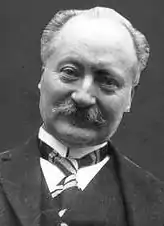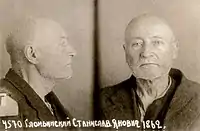Stanisław Głąbiński
Stanisław Głąbiński (25 February 1862 – 14 August 1941[1]) was a Polish politician, academic, lawyer and writer.
Stanisław Głąbiński | |
|---|---|
 | |
| Minister of Foreign Affairs of the Kingdom of Poland in 1918 | |
| Personal details | |
| Born | 25 February 1862 Skole, Austrian Empire |
| Died | 14 August 1941 (aged 79) Kharkiv, Ukrainian Soviet Socialist Republic |
| Profession | Political scientist, Politician |
Born 25 February 1862 in the town of Skole, now in Lviv Oblast, Ukraine, but then within the Habsburg Monarchy.
Professor of Lwów University, dean of its law department (1889–1890) and the University's rector (1908–1909), he was also an activist in the Polish National Democracy movement. In 1911, from January to June he was Railway Minister in the I.R. Government for Cisleithania in Vienna led by Richard von Bienerth-Schmerling. In 1918 he was the third and last Minister of Foreign Affairs of the Kingdom of Poland (1916–1918) before the Kingdom's transformation into the Second Polish Republic.
Along with other ND leaders, Głąbiński opposed the election of the first president of the Second Polish republic with the votes of minorities signing a joint proclamation stating: "we will refuse any kind of support for a government nominated by a president imposed by foreign nationalities - Jews, Germans, and Ukrainians".[2]
In 1923 he served as Minister of Education and Religion. He was a leading member of the Popular National Union and later of the National Party, in 1919–1928 deputy to the Sejm, and in 1928–1935 deputy to the Senate.
After the 1939 Soviet invasion of Poland, he was arrested by the Soviet NKVD, transported to Lubyanka Prison, and died on 14 August 1941 at the age of 79.

References
- https://senat.edu.pl/historia/senat-rp-w-latach-1922-1939/senatorowie-ii-rp/senator/stanislaw-glabinski
- Primed for Violence: Murder, Antisemitism, and Democratic Politics in Interwar Poland, University of Wisconsin Press, Paul Brykczynski, page 24